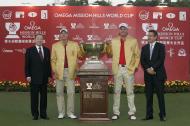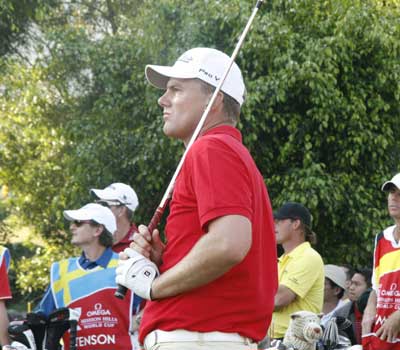ByDavid Ferguson
China.org.cn staff reporter
Sweden produced a superb foursome display and a big final-day swing to overhaul Spain and Australia and win the 2008 Omega World Cup of golf at Mission Hills, Dongguan, China.
The bookies don't often get it wrong. They made Sweden the pre-event favourites for the 2008 Omega World Cup at Mission Hills Dongguan course, and ultimately they were proved right. The Swedes were not the most talked-about team for any of the first three days, but they were always there, just around the periphery of the radar, and on the final day they produced their best round of the week to turn a substantial Spanish/Australian lead into a forceful Swedish victory.
|

|
|
The triumphant Swedish duo of Karlsson and Stenson, resplendent in the golden jackets of the World Cup Winners. [Photo credit: David Paul Morris / AVW]
|
"It's a great honour to play for your country, and obviously even better when you win," said Stenson.
"I think Sweden only won it once before in 1991, so it was about time that we changed that and got our name up there again. I had a terrific week together with Robert. I think you can't help but bond together with your partner and we grew a little bit closer this week which was great."
"I was starting to run out of tournaments, so it was nice to win this one. It has been a while," added Stenson, who despite enjoying a great season in 2008 and making the Ryder Cup Team had failed to secure any victories.
Karlsson, European Tour Order of Merit Winner in 2008, added to his partner's remarks: "We thought it might be our turn today. We knew we needed to play better than yesterday. It was important for us to pick up a few shots early which we did. I played the World Cup last year, and I definitely enjoy coming here. It's great, this golf course sets up really well and is inviting to play and good fun."
Henrik Stenson and Robert Karlsson were the highest ranked pairing in the tournament, and on the final day they produced a matchless score of 63 – nine-under par – to equal Spain's own effort from the Friday foursomes. They did it in copybook style, with nine birdies and no bogeys, but the key to the victory was the manner in which they played.
Centre of the fairway and heart of the green were hit with relentless precision, and the fact that par was never under threat removed a key element of stress from their game and allowed them to relax and wait for the birdie putts to drop. The other critical factor in their success was their play on the par-5s. The Olazabal course at Dongguan offers the players a 'bonus' of an extra one of these, five rather than four as is normal on a par-72 course, and the Swedish duo dutifully birdied every single one of them. So consistent was their game that they were able to afford themselves the luxury of passing up birdie and eagle opportunities – short or makeable putts - on 10, 15, 16, 17 and even the final hole, and still win by a comfortable three-stroke margin.
|

|
|
Smooth as you like - Karlsson surveys another textbook strike on the tee at 17.
|
The par-5s were one of the key differences between the Swedes and the two final-round leaders. Spain made only two birdies from five opportunities, and Australia, with one bogey and one birdie, played them in even par, losing a total of five strokes to the eventual winners. But the other critical factor was this consistency of play. Both Australia and Spain stuttered with their game all the way through.
There was no clearer evidence for this that the physical distance between the teams. Sweden started with Germany in the second-to-last group. Spain and Australia made up the final group. There was a nominal gap of ten minutes between starters. By the time they reached hole fifteen Sweden and Germany had already finished the hole and completed a longish walk to the 16th tee before Spain and Australia arrived on the 15th. The gap by then was over 20 minutes.